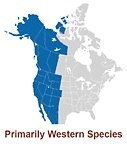A practical guide to bird watching in Sonoma County, California
(Unless otherwise indicated, all phone numbers are in the 707 area code)
A practical guide to bird watching in Sonoma County, California
(Unless otherwise indicated, all phone numbers are in the 707 area code)


Formerly considered a single species with what is now Eastern Towhee (Pipilo erythrophthalmus), as Rufous-sided Towhee, and older books will use that name. The two species share many traits: The black head; staring red eye; bright rufous sides; white breast; and a long, black tail with white spots at the outer corners that are conspicuous in flight. Spotted Towhee, however, has white wing bars and white spots on the scapulars which give the back and wings an overall white spotted look. Eastern Towhee has an isolated white patch on the flank (actually at the base of the primaries) but is otherwise black on the back. Females of both species are similar to the males but browner in hue. In males and females in Sonoma County, however, the difference is subtle and the sexes look fairly similar.
Common throughout the county, preferring dense brushy areas. Scrapes through leaf litter looking for food, often by jumping backwards, using its feet to move away debris. Often heard before it's seen. Apparently there is considerable geographical variation in vocalizations. In Sonoma County, however, a distinctive nasal, cranky-sounding yaa! is most common. The song of local birds, usually heard in the spring, is a straight, fairly emphatic trill. The song is most often confused with that of Orange-crowned Warbler. The song of the warbler is also a simple trill but more delicate and melodic, rising in the middle and then falling away, but they can be difficult to distinguish in isolation (Spring Lake in April can be excellent for making a comparison). Note that the recording of the song on the Cornell Lab page linked to below is not typical for Sonoma County. The nasal yaa! towards the end of the recording is very similar to what we hear here, but the clear notes preceding the trill at the beginning of the recording should be ignored. Just listen for the trill (which in our birds is longer and more emphatic). The trill of the warbler (link below) is close to what we hear here in Sonoma County. Note also that Dark-eyed Junco may at times produce a very similar trill.
Further reading:
Bolander and Parmeter, Birds of Sonoma County California, rev. ed., 2000, p. 111
Brinkley, National Wildlife Federation Field Guide to Birds of North America, 2007, p. 451
Burridge, ed., Sonoma County Breeding Bird Atlas, 1995, p. 157 (as Rufous-sided Towhee)
Dunn and Alderfer, eds., National Geographic Field Guide to the Birds of North America, 5th ed., 2006, p. 406
Dunn and Alderfer, eds., National Geographic Field Guide to the Birds of North America, 6th ed., 2011, p. 460
Dunne, Pete Dunne’s Essential Field Guide Companion, 2006, pp. 584-585
Ehrlich, Dobkin, and Wheye, The Birder's Handbook, paperback edition, 1988, p. 562 (as Rufous-sided Towhee)
Fix and Bezener, Birds of Northern California, 2000, p. 324
Floyd, Smithsonian Field Guide to the Birds of North America, 2008, p. 416
Kaufman, Field Guide to Birds of North America, 2000, p. 376
Lukas, Bay Area Birds: From Sonoma County to Monterey Bay, 2012, pp. 246-247, 248, 249
Parmeter and Wight, Birds of Sonoma County California, Update (2000-2010), 2012, p. 66
Peterson, Birds of Eastern and Central North America, 5th ed., 2002, p. 286
Peterson, Field Guide to Birds of Western North America, 4th ed., 2010, p. 326
Peterson, Western Birds, 3rd ed., 1990, p. 330
Sibley, Field Guide to Birds of Western North America,1st ed., 2003, p. 406
Stokes, Stokes Field Guide to the Birds of North America, 1st ed., 2010, p. 652
Vuilleumier, American Museum of Natural History, Birds of North America: Western Region, 2011, p. 410
Voice: Cornell Lab of Ornithology: All About Birds--Spotted Towhee
Voice: Cornell Lab of Ornithology: All About Birds--Orange-crowned Warbler
© Colin Talcroft, 2009, 2010, 2011, 2012, 2013
Unless noted, all photos by the author. If you would like to use one of my images, please ask for permission for non-commercial use with proper credit or commercial use with proper compensation.

Spotted Towhee, Lake Ralphine, Santa Rosa, December 6, 2011

Spotted Towhee, Spring Lake, Santa Rosa, December 22, 2011
Spotted Towhee
Pipilo maculatus
1990-2013 Sonoma County data. Graph provided by eBird (www.ebird.org), generated August 29, 2013
EBird-reported occurrence in Sonoma County

